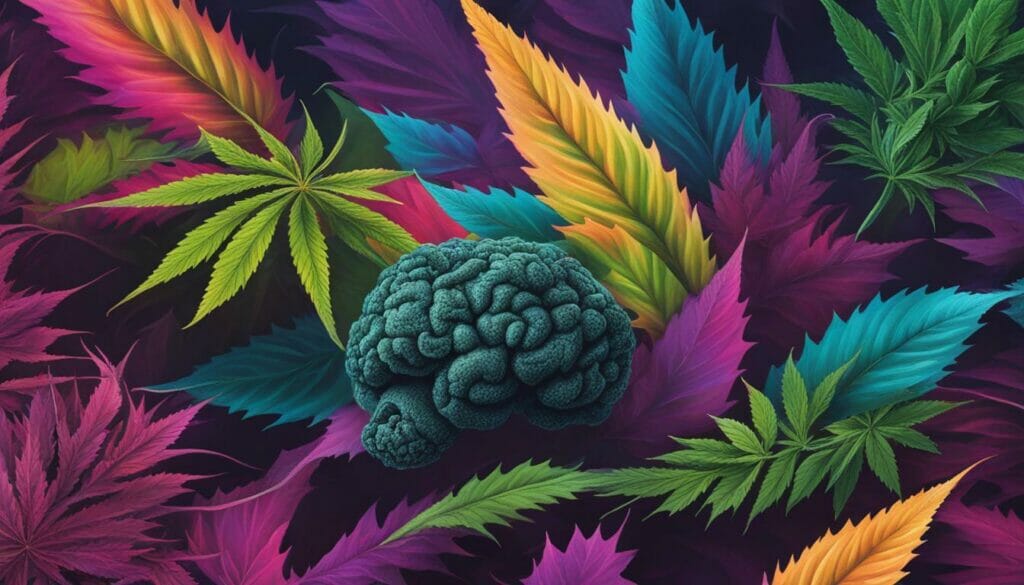Understanding Cannabis-Induced Psychosis: Facts & Insights

Cannabis, also known as marijuana, has been a subject of controversy and debate for its potential effects on mental health. One specific concern that has gained attention is the association between cannabis use and psychosis—a mental health condition characterized by a loss of contact with reality, marked by hallucinations, delusions, and disorganized thinking. In this article, we’ll discuss the phenomenon of cannabis-induced psychosis to help you better understand the risks.
Please note that we are not medical professionals and this article is not intended to be taken as medical advice.
Key Takeaways:
- Cannabis-induced psychosis is relatively rare, with an estimated risk between 0.4% to 0.6%.
- Factors such as genetic predisposition, frequency of cannabis use, and individual vulnerability play a role in determining the likelihood of developing psychosis.
- The association between cannabis use and psychosis is complex and not fully understood, but research suggests that high-potency cannabis may pose a greater risk for psychosis.
- Treating cannabis-induced psychosis typically involves a combination of medication, psychoeducation, and psychosocial interventions.
- Preventing cannabis-induced psychosis involves early identification of individuals at risk and providing accurate information about the potential risks of cannabis use.
Prevalence of Cannabis-Induced Psychosis:
Research suggests that cannabis-induced psychosis is relatively rare, with an estimated risk of 0.4 to 0.6%. This means that out of 100 people who use cannabis, less than one is at risk of developing psychosis. However, it is important to note that the actual prevalence may be higher, as some individuals may not seek treatment or may not be diagnosed accurately.
The risks of developing cannabis-induced psychosis are believed to be influenced by a combination of genetic, environmental, and neurobiological factors. Individuals with a family history of psychosis, a personal history of substance use, or a history of traumatic experiences may be more vulnerable. Frequent and heavy cannabis use, especially during adolescence and early adulthood, may also increase the risk of developing psychosis.
Early detection and prevention are essential in managing the risks of cannabis-induced psychosis. Signs of psychosis may include changes in behavior or personality, impaired cognition, and disordered thinking. Individuals who experience such symptoms or have a history of mental illness should seek professional help.
Cannabis-induced psychosis prevention involves targeted interventions and educational campaigns. Providing accurate information about the potential risks of cannabis use is crucial, especially among vulnerable populations. Education and awareness campaigns can help individuals make informed decisions regarding their cannabis use, while early identification and appropriate treatment can help manage symptoms and improve outcomes.
Relationship Between Cannabis and Psychosis
The association between cannabis use and psychosis is complex and not fully understood. While some studies have found a positive correlation, others have failed to establish a concrete link. More recent studies have suggested that cannabis use may be a contributing factor, rather than the sole cause, of psychosis. It is likely that a combination of genetic, environmental, and neurobiological factors interacts with cannabis use to elevate the risk of psychosis.
Research has identified various causes and risk factors for cannabis-induced psychosis. Genetic predisposition is believed to play a role, with studies indicating that individuals with a family history of psychosis have an increased risk of developing the condition. Other factors, such as frequency and duration of cannabis use, age of onset, and individual vulnerability, have also been implicated in the development of cannabis-induced psychosis.
Age of Onset
Studies have shown that cannabis-induced psychosis tends to occur earlier in life compared to non-cannabis-related psychosis. Individuals who develop psychosis often experience their first episode in their late teens or early twenties. This early onset can have significant implications for the individual’s long-term mental health outcomes.
Psychopathological Symptoms
Symptoms of cannabis-induced psychosis can vary among individuals, but commonly include hallucinations, delusions, and disorganized thinking. Hallucinations can involve seeing or hearing things that are not real, and delusions can include holding false, fixed beliefs. Disorganized thinking may manifest as difficulty with logical thinking, poor memory, or difficulty expressing oneself coherently.
Other symptoms of cannabis-induced psychosis may include paranoia, anxiety, and changes in mood or behavior. These symptoms can be distressing and disruptive to an individual’s daily life. It is important to differentiate cannabis-induced psychosis from other primary psychotic disorders, such as schizophrenia or bipolar disorder, as the appropriate management and treatment options may differ.
Treatment for cannabis-induced psychosis typically involves a combination of medication, psychoeducation, and psychosocial interventions. Antipsychotic medications are often prescribed to alleviate symptoms such as hallucinations and delusions. Psychoeducation can help individuals better understand their symptoms and manage their condition. Psychosocial interventions, such as cognitive-behavioral therapy and supportive therapy, can help individuals cope with their symptoms and improve their overall functioning.
The course of cannabis-induced psychosis can be unpredictable and may require long-term management. It is important to consult with a healthcare professional if you or someone you know is experiencing symptoms of psychosis.
Cannabis Potency and Psychosis Risk
The potency of cannabis, particularly the level of delta-9-tetrahydrocannabinol (THC), has been implicated in the development of psychosis. THC is the primary psychoactive component of cannabis, responsible for its mind-altering effects. Research suggests that high-potency cannabis, such as strains with a high THC content, may pose a greater risk for psychosis compared to low-potency cannabis.
One study published in The Lancet Psychiatry found that individuals who used high-potency cannabis daily were five times more likely to develop psychosis compared to those who never used cannabis. Additionally, another study found that the risk of developing psychosis increased as the potency of cannabis increased, with individuals who used strains with a THC content of 10% or more having a significantly higher risk for psychosis.
The long-term effects of cannabis-induced psychosis can be devastating, contributing to social, occupational, and educational impairment. Therefore, it is crucial to recognize the potential risks associated with high-potency cannabis and to engage in informed decision-making surrounding cannabis use.

Gender Differences
Some studies have reported gender differences in the association between cannabis and psychosis. Research suggests that males may be more susceptible to developing cannabis-induced psychosis than females. However, the reasons for these gender differences are not yet clear, and further research is needed to elucidate the underlying mechanisms.
Managing cannabis-induced psychosis requires a holistic approach that takes into account the individual’s unique needs and circumstances. Treatment typically involves a combination of medication, psychoeducation, and psychosocial interventions. Antipsychotic medications can help alleviate symptoms such as hallucinations and delusions, while psychosocial interventions such as cognitive-behavioral therapy and supportive therapy can improve functioning and coping skills.
Preventing cannabis-induced psychosis involves targeted interventions and educational campaigns. Early identification of individuals at risk, such as those with a family history of psychosis or previous psychotic experiences, is crucial to reducing the likelihood of developing cannabis-induced psychosis. Providing accurate information about the potential risks of cannabis use, especially among vulnerable populations, can help individuals make informed decisions regarding their cannabis use.
Treatment and Management
Treating cannabis-induced psychosis typically involves a combination of medication, psychoeducation, and psychosocial interventions. Antipsychotic medications, such as risperidone and olanzapine, are often prescribed to alleviate symptoms such as hallucinations and delusions. These medications work by blocking dopamine receptors in the brain, which can help reduce psychotic symptoms. However, they may also have side effects such as sedation and weight gain.
In addition to medication, psychoeducation is a key component of treatment for cannabis-induced psychosis. Psychoeducation involves providing individuals and their families with accurate information about the condition, including its causes, symptoms, and treatment options. This can help individuals make informed decisions about their treatment and improve their overall understanding of the condition.
Psychosocial interventions can also be helpful in managing cannabis-induced psychosis. These interventions, which may include cognitive-behavioral therapy or supportive therapy, can help individuals cope with their symptoms and improve their overall functioning. Psychosocial interventions can also address underlying psychological factors that may contribute to the development of psychosis.
Coping with Cannabis-Induced Psychosis
Living with cannabis-induced psychosis can be challenging, but with the right support and treatment, many individuals are able to manage their symptoms and improve their overall functioning. Some strategies that may be helpful in coping with cannabis-induced psychosis include:
- Seeking professional help from a mental health provider
- Participating in psychoeducation and psychosocial interventions
- Engaging in stress-reducing activities, such as mindfulness meditation or yoga
- Supporting a healthy lifestyle through regular exercise, a balanced diet, and adequate sleep
- Limiting cannabis use or avoiding it altogether, especially if there is a family history of psychosis or other risk factors
It is important to remember that managing cannabis-induced psychosis is a multifaceted process that requires a comprehensive and integrated approach. With the right treatment and support, individuals with cannabis-induced psychosis can lead fulfilling and productive lives.
Prevention
Preventing cannabis-induced psychosis involves targeted interventions and educational campaigns. Early identification of individuals at risk, such as those with a family history of psychosis or previous psychotic experiences, is crucial in preventing the onset of cannabis-induced psychosis. Providing accurate information about the potential risks of cannabis use, especially among vulnerable populations, can help individuals make informed decisions regarding their cannabis use.
Interventions aimed at reducing the risk of cannabis-induced psychosis include cognitive-behavioral therapy, psychoeducational programs, and motivational interviewing. These interventions aim to address the misconceptions and beliefs surrounding cannabis use, and to provide individuals with the necessary skills to cope with stressors and manage their cannabis use.
Research has also shown that early intervention and treatment can improve outcomes for individuals with cannabis-induced psychosis. Family-based interventions and peer support groups can also be helpful in promoting recovery and providing a supportive environment for individuals with psychosis.
Preventing cannabis-induced psychosis requires a multifaceted approach that involves targeted interventions, education, and support. Early identification and treatment of individuals at risk, along with accurate information and support for those struggling with cannabis use, are crucial in preventing the onset of psychosis.
Conclusion
Understanding cannabis-induced psychosis is essential for both healthcare professionals and individuals using cannabis. While the association between cannabis use and psychosis is complex, research suggests that cannabis-induced psychosis is relatively rare and not everyone who uses cannabis will develop psychosis. Factors such as genetic predisposition, cannabis potency, and individual vulnerability play a role in determining the risk. Early identification, accurate information, and appropriate treatment are vital in addressing cannabis-induced psychosis and its associated symptoms.
For more information about the effects, risks, and therapeutic potential of cannabis, visit our blog.
FAQ
Q: What is cannabis-induced psychosis?
A: Psychosis refers to a mental health condition characterized by a loss of contact with reality, marked by hallucinations, delusions, and disorganized thinking.
Q: How prevalent is cannabis-induced psychosis?
A: Research suggests that the risk of developing psychosis by using cannabis is estimated to be around 0.4 to 0.6%. It is important to note that not everyone who uses cannabis will develop psychosis.
Q: What is the relationship between cannabis and psychosis?
A: The association between cannabis use and psychosis is complex and not fully understood. While some studies have found a positive correlation, others have failed to establish a concrete link. It is likely that a combination of genetic, environmental, and neurobiological factors interacts with cannabis use to elevate the risk of psychosis.
Q: At what age does cannabis-induced psychosis typically occur?
A: Cannabis-induced psychosis tends to occur earlier in life compared to non-cannabis-related psychosis. Individuals who develop cannabis-induced psychosis often experience their first episode in their late teens or early twenties.
Q: What are the symptoms of cannabis-induced psychosis?
A: Symptoms of cannabis-induced psychosis can vary among individuals but may include hallucinations, delusions, disorganized thinking, paranoia, anxiety, and changes in mood or behavior.
Q: Does cannabis potency affect the risk of psychosis?
A: Research suggests that high-potency cannabis, such as strains with a high THC content, may pose a greater risk for psychosis compared to low-potency cannabis.
Q: Are there gender differences in the association between cannabis and psychosis?
A: Some studies have reported that males may be more susceptible to developing cannabis-induced psychosis than females. However, further research is needed to understand the underlying mechanisms.
Q: How is cannabis-induced psychosis treated and managed?
A: Treatment for psychosis typically involves a combination of medication, psychoeducation, and psychosocial interventions. Antipsychotic medications are often prescribed, and psychosocial interventions can help individuals cope with symptoms and improve functioning.
Q: How can cannabis-induced psychosis be prevented?
A: Preventing cannabis-induced psychosis involves targeted interventions and educational campaigns. Early identification of individuals at risk and providing accurate information about the potential risks of cannabis use are crucial in prevention.
Suggested Articles
;)
;)
;)




 10 Jul 2025
10 Jul 2025  22 min read
22 min read


 September 15, 2023
September 15, 2023 


RESPONSES (0)
No responses yet. Be the first to respond!